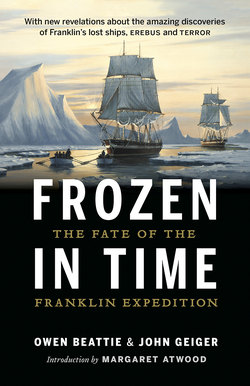Frozen in Time

Реклама. ООО «ЛитРес», ИНН: 7719571260.
Оглавление
Owen Beattie. Frozen in Time
Отрывок из книги
For Shirley F. Keen.—J.G.
For my first grandchild, Akasha (a.k.a. Pumpy)—O.B.
.....
Yet survive he did, and, in late summer, a lane of open water appeared into which, on 15 August 1833, the men launched their boats with a fine westerly breeze. Having “almost forgotten what it was to float at freedom on the seas,” they made 72 miles (116 km) on 17 August alone. Propelled by the wind when it blew, they rowed on amongst the icebergs when it dropped—once for a stretch of twenty hours without rest. After nine days heading east, they finally spotted a sail in the distance. The men desperately rowed towards the vessel, but after several hours a wind came up and the ship moved off to the southeast. Soon another sail was sighted, but that ship too sailed on. Wrote John Ross: “it was the most anxious moment that we had yet experienced, to find that we were near to no less than two ships, either of which would have put an end to all our fears and all our toils, and that we should probably reach neither.” But an hour later the wind dropped, and they again began to close on one of the ships. Finally, they saw it lower a boat that rowed over to meet them. Stunned, the mate in command assured Ross that he couldn’t be who he said he was, as Ross was known to have died two years earlier. That conclusion, Ross replied, had been “premature.” They were unshaven, filthy, “dressed in the rags of wild beasts,” gaunt and starved to the bone. But they were definitely alive.
That John Ross is not celebrated today as one of the epic heroes of polar exploration is remarkable. Perhaps his all-too human failings militated against such a reputation, for John Ross was the antithesis of what one might expect in a hero: corpulent, irritable and overly solicitous of class. In contrast to Parry, who did his best to provide for the comfort of his men, Ross held in contempt the entire notion of the importance of creature comforts in maintaining morale. While still aboard the Victory, for instance, Ross had reduced the heat each winter to lessen the effects of condensation. He then responded to complaints from the freezing crew by bragging loudly about his unusual capacity for generating body heat. No one ever got close enough to him to notice. There was something improbable, even absurd, about John Ross. And he paid a terrible price for his haughtiness when a disgruntled underling later helped publish an unofficial account of the expedition: a remarkable rant called The Last Voyage of Capt. John Ross—vilifying Ross’s character and mocking his physical attributes. More damaging still was the book’s inventory of his alleged shortcomings as a leader, culminating in a declaration that while “the men were conscious that they owed him obedience; they were not equally convinced that they owed him their respect and esteem.”
.....